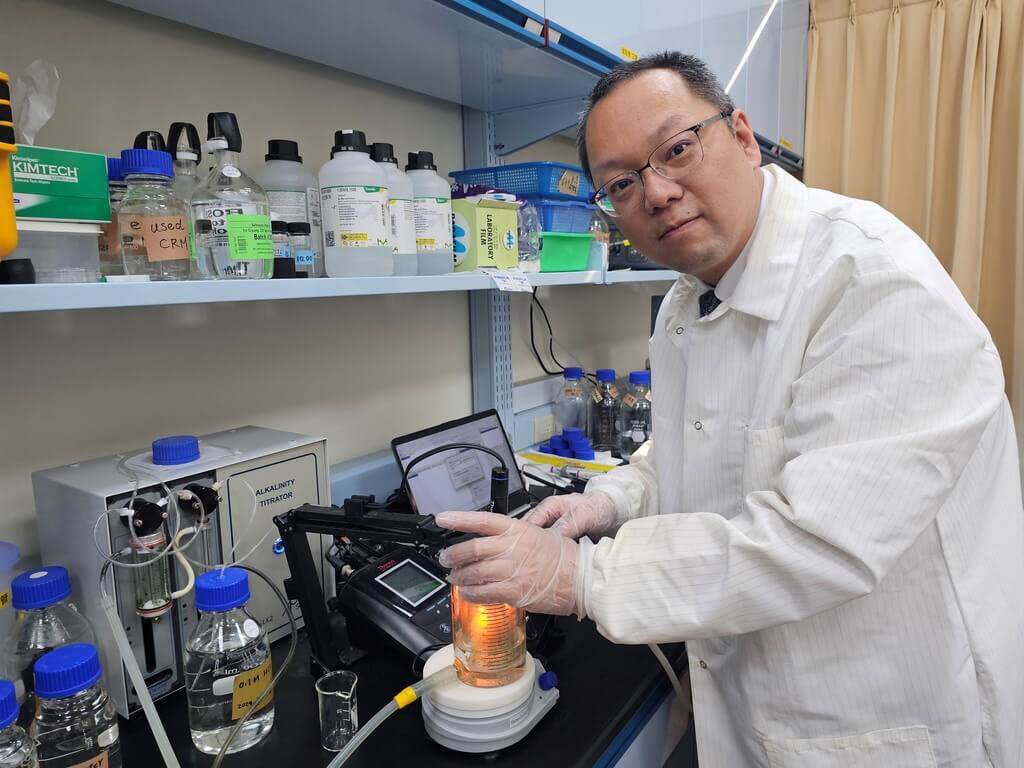A study by a Taiwan-based researcher has found that artificially alkalinized seawater can absorb more carbon dioxide, helping mitigate the greenhouse effect.
Lui Hon-kit (雷漢杰), an associate professor in the Department of Oceanography at National Sun Yat-sen University, conducted a time-series analysis using 26 years of data from the South China Sea and led the world’s first study demonstrating the feasibility of ocean alkalinity enhancement (OAE), the university said Thursday.
OAE is a geoengineering technique designed to enhance seawater’s ability to absorb carbon dioxide. Boosting alkalinity, it helps counteract ocean acidification caused by human-generated carbon dioxide, with a focus on approaches that keep the carbon footprint low.

Photo courtesy of the National Sun Yat-sen University
About one-quarter of the greenhouse gas emissions (26 percent) is absorbed by the ocean through air-sea carbon dioxide exchange, Lui wrote.
Citing data collected from seawater within 10m of the surface between 1999 and last year at the South-East Asia Time-series Study (SEATS) station, Lui said total alkalinity increased annually by 0.56 micromoles per kilogram.
As a result, seawater in the area absorbs 28 percent more carbon dioxide than would be expected from carbon dioxide equilibrium with the atmosphere. This helps recover some of the losses in pH and calcium carbonate saturation lost due to acidification, he said.
OAE research is still in its early stages, and the long-term effects of the technique on ocean carbonate chemistry had not been explored before his study, Lui said.
"The SEATS case provides a regional perspective that supports the global understanding of long-term seawater alkalinization," he said.
Liu’s paper has been published in Geophysical Research Letters and is available for download.

US climber Alex Honnold is to attempt to scale Taipei 101 without a rope and harness in a live Netflix special on Jan. 24, the streaming platform announced on Wednesday. Accounting for the time difference, the two-hour broadcast of Honnold’s climb, called Skyscraper Live, is to air on Jan. 23 in the US, Netflix said in a statement. Honnold, 40, was the first person ever to free solo climb the 900m El Capitan rock formation in Yosemite National Park — a feat that was recorded and later made into the 2018 documentary film Free Solo. Netflix previewed Skyscraper Live in October, after videos

NUMBERS IMBALANCE: More than 4 million Taiwanese have visited China this year, while only about half a million Chinese have visited here Beijing has yet to respond to Taiwan’s requests for negotiation over matters related to the recovery of cross-strait tourism, the Tourism Administration said yesterday. Taiwan’s tourism authority issued the statement after Chinese-language daily the China Times reported yesterday that the government’s policy of banning group tours to China does not stop Taiwanese from visiting the country. As of October, more than 4.2 million had traveled to China this year, exceeding last year. Beijing estimated the number of Taiwanese tourists in China could reach 4.5 million this year. By contrast, only 500,000 Chinese tourists are expected in Taiwan, the report said. The report

Temperatures are forecast to drop steadily as a continental cold air mass moves across Taiwan, with some areas also likely to see heavy rainfall, the Central Weather Administration (CWA) said. From today through early tomorrow, a cold air mass would keep temperatures low across central and northern Taiwan, and the eastern half of Taiwan proper, with isolated brief showers forecast along Keelung’s north coast, Taipei and New Taipei City’s mountainous areas and eastern Taiwan, it said. Lows of 11°C to 15°C are forecast in central and northern Taiwan, Yilan County, and the outlying Kinmen and Lienchiang (Matsu) counties, and 14°C to 17°C

STEERING FAILURE: The first boat of its class is experiencing teething issues as it readies for acceptance by the navy, according to a recent story about rudder failure The Hai Kun (海鯤), the nation’s first locally built submarine, allegedly suffered a total failure of stern hydraulic systems during the second round of sea acceptance trials on June 26, and sailors were forced to manually operate the X-rudder to turn the submarine and return to port, news Web site Mirror Daily reported yesterday. The report said that tugboats following the Hai Kun assisted the submarine in avoiding collisions with other ships due to the X-rudder malfunctioning. At the time of the report, the submarine had completed its trials and was scheduled to begin diving and surfacing tests in shallow areas. The X-rudder,